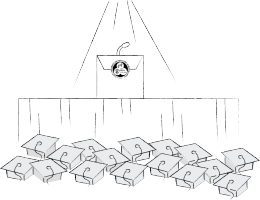
As graduation swiftly approaches, our seniors are inundated with an outpouring of advice for the future. Words of wisdom come from parents, fellow students and professors. On commencement day itself, student speakers and alumni offer their two cents through speeches. No doubt, their words have value and resonate with students and faculty alike, but will graduates remember who spoke these words in the years to come? Bringing a prominent keynote speaker to campus for the entire graduating senior class will give those students a final chance to come together, as well as help put Binghamton University on the map.
A keynote speech is an opportunity to gather the entire graduating class for one ceremony. In the spring, a single commencement ceremony is not feasible, between the five distinct colleges and the sheer number of graduates. But it isn’t that one academic class never occupies the same room; at the start of freshman year, students are united for Convocation, a ceremony that includes a keynote speaker. We should go out the way we came in. The keynote speech does not need to occur at commencement, but could take place the week prior, around the time Senior Day took place last year.
Let us follow the example of our fellow top public universities. Stephen Colbert spoke at University of Virginia’s valedictory exercises in 2013, which occurred a few days before its commencement ceremony. President Barack Obama spoke at The Ohio State University’s commencement last May. Booking a prominent speaker is not impossible simply because we are a public school — what we lack in endowment, we can make up for in strategy. Smaller, less prestigious colleges book keynote speakers by playing upon alumni and familial connections. The University has used this strategy in the past, with Billy Baldwin giving a keynote address for fall 2010 commencement. We say, why stop there?
While student speakers and University officials can share experiences relevant to BU students and their families, esteemed keynote speakers can relate to a larger audience. Who can forget Steve Jobs’ commencement speech at Stanford University or David Foster Wallace’s speech at Kenyon University? These speeches have mass appeal, and their messages remain inspirational through the years. Schools with prominent commencement speakers receive positive national press and accolades. Of course, no one is expecting the administration to book Elon Musk or J.K. Rowling, but hosting a successful, well-spoken and well-known individual could do wonders for our school’s reputation and morale.
Let’s start and end our college careers as a unified class. Friends may not be able to graduate together, but they can walk away with the same words of wisdom ringing in their ears.


